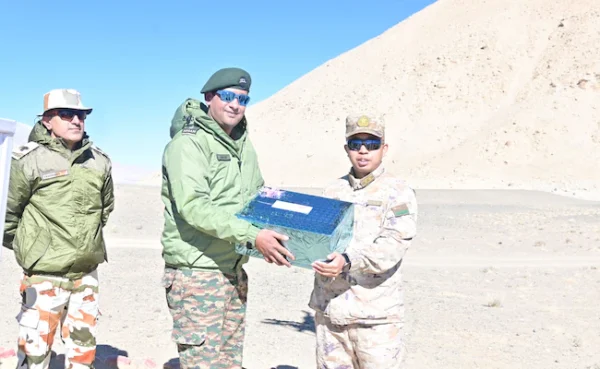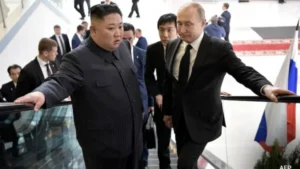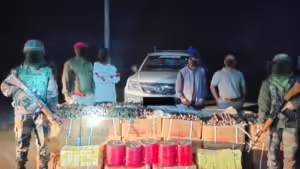
New Delhi: Indian and Chinese soldiers exchanged Diwali sweets at five locations along the Line of Actual Control, including two in Ladakh. This comes a day after the two sides completed military withdrawal from the Depsang and Demchok areas in line with last week’s patrolling agreement.
The sweets were exchanged at Chushul Moldo and Daulat Beg Oldie in Ladakh, Bancha (near Kibutu) and Bumla in Arunachal Pradesh and Nathula in Sikkim.
The patrolling agreement called for disengagement of military personnel and infrastructure, including temporary camps, from the Depsang Plains and Demchok and withdrawal of troops to positions held before April 2020.
The agreement is expected to end nearly four years of military and diplomatic tensions that began with skirmishes and violent clashes in the Pangong Lake and Galwan areas in May-June 2020.
These clashes also included the death of 20 Indian soldiers in Galwan in June.
Indian Army sources told NDTV on Wednesday that the verification process – to check that China has indeed pulled back its troops, is ongoing, and ground-level commanders of each side will inform each other before regular patrols “to avoid misunderstandings”. Significantly, both Delhi and Beijing will continue to have monitoring options in Depsang and Demchok.
Depsang, Demchok disengagement photos
Last week NDTV accessed the first satellite images of the disengagement process.
The agreement was announced on Monday and the following Monday a satellite image from the Depsang plains – from the ‘Y’ junction – showed four vehicles and two tents.
A second photo taken four days later showed Indian military tents being removed and vehicles being driven away, while pictures taken from Demchok showed temporary Chinese structures being removed by October 25.
“Trying to restore trust”
On the disengagement process, Army Chief Gen Upendra Dwivedi said this week that the Indian Army was “trying to restore trust” in its Chinese counterpart.
“It (rebuilding trust) will happen when we are able to see each other and assure and reassure each other that we are not intruding into the buffer zone that has been created,” the general said.
The de-escalation of military tensions in the region will be done after the disengagement is over.
External Affairs Minister S Jaishankar declined to give a timeline for de-escalation, saying it would not happen until Delhi was sure that its Beijing counterparts had honoured their part of the agreement.
De-escalation of tensions in other areas, including the Gogra-Hot Springs region in Ladakh after the Indian and Chinese troops disengaged in September last year, is still a matter of concern. However, intelligence inputs suggest that China continues to occupy large parts of Indian territory in the Depsang plains in the north. Depsang is considered crucial for India as it provides access to the airstrip at Daulat Beg Oldie and prevents Chinese troops from threatening vital logistics hubs in the region.
Meanwhile, Demchok is divided into two parts by the LAC; India controls the western part, which is claimed by China.
“After the tensions subside, discussions will be held on how to manage the borders,” he said in Mumbai.
The India-China patrolling agreement was announced hours ahead of Prime Minister Narendra Modi’s visit to Russia for the BRICS summit, where he will hold a bilateral meeting with China’s Xi Jinping.
Speaking after it was confirmed, Mr Modi told the Chinese leader, “our priority should be to ensure that peace and stability is maintained along our border”, and emphasised the need for “mutual trust, mutual respect”.

Continuing the achievement of the journey of effectiveness and credibility of more than 10 years in the career of journalism, as a woman journalist, I am Serving as the founder, promoter and editor of DiaryTimes with the trust and support of all. My credible coverage may not have given a big shape to the numbers, but my journey presents articles that make you aware of the exact and meaningful situations of Himachal’s politics, ground issues related to the public, business, tourism and the difficult geographical conditions of the state and financial awareness. DiaryTimes, full of the experience of my precise editorial expertise, is awakening the flame of credible journalism among all of you, so that the eternal flame of meaningful change can be lit in the life of the people of the state and the atrocities being committed against the people can be brought to the fore, I am motivated for that. If even a small change comes with the power of my journalism and the whole world becomes a witness to that issues, then I will consider myself fortunate.





